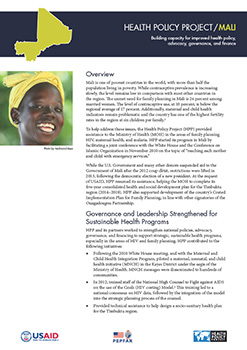The Health Policy Project ended in 2016. Work continued under Health Policy Plus (HP+) until 2022.
Mali

Country & Regional Programs
- ► Africa
- ► Asia and the Middle East
- ► Europe and Eurasia (E&E)
- ► Latin America and the Caribbean (LAC)
Mali
With high fertility rates and two-thirds of its population under the age of 25, Mali has a rapidly growing, young population that has doubled over the past 20 years. Lack of access to vital health services contributes to high rates of maternal and child morbidity and mortality rates, and the health and well-being of people in Mali face continued threats from infectious diseases, including malaria and HIV. An integrated approach that includes stakeholders from national, district, and municipal government, as well as civil society and community groups is needed to ensure that policies and systems are put in place to expand the reach of services and commodities to improve the health of Malians.
What We Do
The overall goal of the Health Policy Project (HPP) in Mali is to strengthen policy, advocacy, and governance at the national level and selected districts for strategic, equitable, and sustainable health programming. The project provides training and technical assistance to key partners, including members of Parliament, religious leaders, women’s organizations, and youth groups to improve their capacity to advocate for improved health programs and develop a collaborative approach.
To achieve the overall objective, there are three program components:
Improve Effectiveness of Malian Advocacy to Encourage Government Resources for Priority Health Programs
HPP focuses on improving the capacity of local organizations to advocate for increased government resources for health programs. HPP also supports training and technical assistance to members of Parliament, key departments within the Ministry of Health, religious leaders, and community groups on using the RAPIDWomen Model—an interactive advocacy software tool that links family planning (FP) and women-centered health interventions. The program also provides technical assistance in using additional models and tools to develop strategic plans for health programs.
Build Malian Capacity to Foster, Formulate, and Disseminate Supportive Policies
HPP activities work directly with policy- and decisionmakers within the government of Mali (GOM) to improve their ability to design and disseminate policies that positively affect the health of their citizens. GOM leaders receive training on how to use existing tools and models, including Spectrum and RAPID software models, to better understand the importance of investing in FP initiatives. This also influences their capacity to develop effective policies based on country-specific data.
HPP also assists the GOM in disseminating policies and laws more widely by providing support for communication materials. In addition, HPP supports the implementation of a monitoring action plan to promote citizen participation in policymaking and promote accountability among government leaders, particularly in the response to HIV. HPP is also working with the Ministry of the Promotion of the Woman, Children and the Family (MPFEF) to develop and integrate gender priorities and a monitoring plan into the newest national Health and Social Development Program (PRODESS III).
Increase Malian Capacity to Advocate for Healthy Behaviors
HPP provides technical assistance to the Division of Reproductive Health (DSR) of the Ministry of Health, National Program for Malaria Control (PNLP), and the Executive Secretary of the National High Council on HIV and AIDS to enhance their national health awareness campaigns. The project also works to build the capacity of local leaders to influence their constituencies in adopting healthy behaviors and using available health services. As part of the U.S. White House’s partnership with the Organization of the Islamic Conference (OIC) and the GOM, HPP conducts advocacy sessions for Christian and Muslim religious leaders to encourage their communities to adopt healthy behaviors in FP/RH, HIV, and malaria prevention and care.
Recent Progress and Achievements
- HPP organized a joint conference for the Organization of the Islamic Conference (OIC) and the United States and Mali governments about “Reaching Every Mother and Baby in the OIC with Emergency Care.” Following the initial conference, 87 religious leaders have attended training workshops on maternal, neonatal, and child health since May 2011.
- With HPP support, religious leaders previously trained under the Health Policy Initiative continue to conduct policy dialogue sessions to improve the knowledge about FP/RH, HIV, maternal and child health, and malaria in their communities, reaching nearly 50,000 total people.
- HPP collaborated with the Network of Malian Parliamentarians on Population and Development (REMAPOD) and Islamic Network for Population Development (RIPOD) to conduct a workshop for 40 new deputies on the Islamic view of FP/RH issues.
Publications and Resources
Achieving the MDGs: The Contribution of Family Planning - Mali (English)
Achieving the MDGs: The Contribution of Family Planning - Mali (French)
News
Story from the Field: Mixing Tradition with Technology to Improve Women's Health
Story from the Field: Religious Leader Becomes Example for Practicing Family Planning in Mali
Story from the Field: Imam Institutes Pre-Marriage Counseling to Improve Family Health in Mali
GHI Executive Director Lois Quam Visits HPP in Mali
Partners
HPP collaborates with a range of in-country and international partners in Mali, including:
- Executive Secretary of the National High Council on HIV and AIDS (SE/HCNLS)
- Division of Reproductive Health (DSR) of the Ministry of Health
- Kita Reference Health Center (CSREF Kita)
- Ministry of the Promotion of the Woman, Children and the Family (MPFEF)
- National Program for Malaria Control (PNLP)
- Network of People Living with HIV (RMAP+)
- Parliamentarian Network on Population and Development (REMAPOD)


